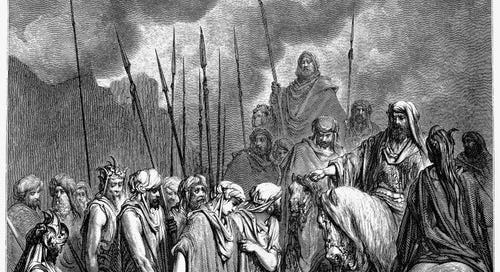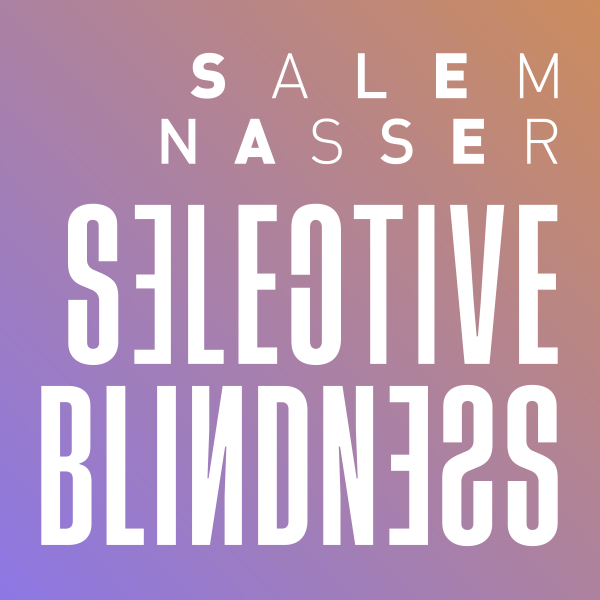"Sacred Violence: The Verses of Others"
"Fight in the cause of God those who fight you, but do not commit aggression: God loves not the aggressors."
I recently learned of a survey whose results were published in the Israeli newspaper Haaretz (only in Hebrew, which already reveals important implications), showing that 47% of Israeli Jews favor having the Army do to the Palestinians what Joshua and the biblical Israelites supposedly did in Jericho, killing all the inhabitants of a conquered city; and that 60% of these same Israeli Jews believe that the biblical commandment to erase Amalek (the biblical enemy who today would be embodied in the Palestinians) would still apply
.
In addition to this high acceptance of the idea of a Palestinian genocide, the survey also reveals that 82% of Israeli Jews support the forced expulsion of Palestinians from Gaza and 56% support the forced expulsion of their own Israeli Arab fellow citizens, who constitute 20% of the country's total population!
Perhaps one should take comfort from the fact that approval for genocide is somewhat lower than that for ethnic cleansing... although, in the concrete reality of the moment, both crimes are being committed simultaneously and blur into each other.
I published a video commenting on the survey results and leave a link here to it.
The biblical reference caught my attention, and it brought back to memory a text I wrote in 2016 that I had entitled "Verses and Violence."
In it, I gave a brief account of an experience that I now revisit and develop a bit further.
At the gym, a conversation between two colleagues reached my ears, or rather, a monologue, since the one who was speaking was one of those people who always have much to say and whom others find difficult to interrupt.
The context here is important: you shouldn't imagine the gym as that vibrant, youthful place where the music is loud and lively, where beautiful specimens of all genders flirt with themselves in the mirror and with others while transforming abs into six-packs... The gym in question was frequented mainly by people who needed weight training to live a little better, for a longer time. The average age was high, though reduced by the presence of the instructors.
Thus, the person I heard speaking was one of those gentlemen who think they know a lot about everything and who could hardly be classified as a progressive. He says: "You know, I went to get the Quran... I wanted to check, you know, this thing that people say... and I saw there, verse 191 really does command killing, it says that killing is better than subjugating..."
I remembered that, coincidentally or not, verse 191 of the Sura of the Cow is one of the favorites of those who try to convince us that violence is inscribed in Islam's DNA and is an express command of its holy book.
I thought, at the time, that probably no one had bothered to alert this speaker, and that he himself had not bothered to educate himself, about what verse 190 or 192 of the same Sura says, about what is said in other verses of other suras, about translation problems (or, as Muslims say, about versions of the meanings of the Quranic text, since, being sacred, it would not be susceptible to translation) or about the enormous complexity of the exercise of Quranic exegesis.
Yes, perhaps that would be asking too much... The fact remains, however, that this speaker allows himself to do something with the Quran that he would not dare do with the Bible. I don't say that he would necessarily do deeper reading and much more sophisticated interpretations of the biblical text, but I only say that he would not allow himself (or is this just my illusion?) to trust that he would find the meaning of the text in its literality.
It's clear that one reason for this, for this differentiation, can be found in the belief that, somehow, the Bible is a sacred text, and that the Quran would be merely a human production and, in that sense, a religious farce.
It wouldn't be someone who would only see violence in the Quran for never having had any contact with the Old Testament, for example.
Literality and shallow interpretation are reserved for the Quran, the other, a total unknown. What is ours is deeper! The other is text, invention; ours is meaning, revealed truth! The other's myth is ridiculous fantasy; our myth is miracle!
I, on the other hand, have always placed the sacred texts of the three monotheisms on the same plane. A first and good reason for this is that, growing up among Muslims, one lived with the "truth" of the revelations of the same unique God from earlier times and of the prophecy with which Abraham, Moses, Christ would have been invested...
And, when young, I did the same type of "textual" reading that my speaking colleague did. In fact, in contact with the scriptures of the three monotheisms, I was surprised that people didn't tear those books apart as soon as they had read them, women before all others.
(I feel here the temptation to develop the discussion about how I relate, today, to monotheisms and their texts, but I leave that for a future moment.)
The monologue of my colleague continued: "At the time, he (Muhammad) said he was a prophet and the people there believed; if it were today, we would have him committed, sent to a clinic..."
And, once again, it's interesting that he didn't ask in the same breath what would become of Jesus or Moses if they dared appear here, resurrecting the dead and transforming staffs into snakes...
Dostoevsky (so as not to say I didn't mention him) conceived in the Parable of the Grand Inquisitor the return of Christ to the Seville of the Inquisition, where he would be put in chains so that he wouldn't try again to impose on men the unbearable burden of freedom
.
We no longer live in times of Inquisition, but I don't know what can be said about servitude... perhaps we would still reserve chains for Christ today.
In any case, some people's imagination reserves the asylum only for eventual and untimely false prophets. Not for their own.
I know that the literalists and exegetes of violence in the Muslim world certainly do more harm to Islam and the world than the literalist and exegete of small dimensions that I happened to overhear by accident.
The fact remains that among us Islam is a great unknown; and a few verses downloaded from the internet are not enough to change that.
And, for total transparency, and as an invitation for future debates, here follow the verses relevant to the debate, taken from the Sura of the Cow (Sura 2 of the Quran):1
190 Fight in the cause of God those who fight you, but do not commit aggression: God loves not the aggressors.
191 Slay them wherever you fall upon them, and expel them from where they had expelled you: apostasy by force is indeed more serious than slaying...
192 But if they desist, then God is all-forgiving, compassionate to each.
193 Fight them until there is no longer forced apostasy, and the religion is God's. If they desist, no aggression is permitted except against the wicked.
I use here Tarif Khalidi's translation.







